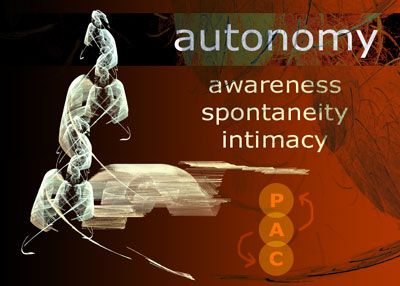Autonomy
 "A Chinese man started to get into a local subway train, when his Caucasian companion pointed out that they could save twenty minutes by taking an express, which they did. When they got off at Central Park, the Chinese man sat down on a bench, much to his friend's surprise. 'Well,' explained the former, 'since we saved twenty minutes, we can afford to sit here that long and enjoy our surroundings.' "
"A Chinese man started to get into a local subway train, when his Caucasian companion pointed out that they could save twenty minutes by taking an express, which they did. When they got off at Central Park, the Chinese man sat down on a bench, much to his friend's surprise. 'Well,' explained the former, 'since we saved twenty minutes, we can afford to sit here that long and enjoy our surroundings.' "There's a gem at the back of the book of the well-known title 'Games People Play', written by Eric Berne, MD. It's a piece on Autonomy and the three capacities required to attain it: awareness, spontaneity and intimacy.
Berne believed:Eric Berne developed Transactional Analysis, which views each of us as comprising a parent, adult and child. The parent in us admonishes us, the adult is reasonable and responsible, and the child is spontaneous and free of hang-ups. The aim of Transactional Analysis is a state in which the 'adult' allows the 'child' to play, without nagging from the 'parent'.
Every person can change.
People are responsible for their own lives.
Everyone is born OK.
Everyone has the capacity to think.
Individuals can decide their own destiny.
To live in this state we need to achieve Autonomy. To do that, we need to recover three capacities:
Awareness - Living in the present moment. Seeing and appreciating what is here around us. To be alive and alert to how we feel, where we are and when it is.
Spontaneity - The freedom to choose and express one's feelings. Freedom from the compulsion to play games with others: freedom from having only the feelings one learnt in childhood.
Intimacy - To be candid, perceptive, and living in the here and now. Keen perception evokes affection, and candidness creates positive feelings.
Autonomy requires that we overcome the limitations imposed on us by:
Our tribal or family historical traditions.In Transactional Analysis terms, this whole preparation consists of obtaining a friendly divorce from our 'parents' (and from other parental influences) so that they may be agreeably visited on occasion, but are no longer dominant.
Our parental, social and cultural background.
The demands of contemporary society.
The role we play in our social circle.
Then we need to give up the easy indulgences and rewards of being a Sulk* or a Jerk**.
We need to be in such a position that whatever we do is a matter of free choice, subject only to our will.
Berne concludes that, for most of us "human life is mainly a process of filling in time until the arrival of death, or Santa Claus (or the Lottery!), with very little choice, if any, of what kind of business one is going to transact during the long wait."
But, "For certain fortunate people there is something which transcends all classifications of behaviour, and that is awareness; something which rises above the programming of the past, and that is spontaneity; and something that is more rewarding than games, and that is intimacy. But all three of these may be frightening and even perilous to the unprepared. Perhaps they are better off as they are, seeking their solutions in popular techniques of social action, such as 'togetherness'."
"This may mean that there is no hope for the human race, but there is hope for individual members of it."
Resume of Games People Play.
An excellent explanation of Transactional Analysis, in: English, French, German, Italian, Portuguese, Spanish, Hungarian, Bulgarian.
* Sulk: angry since childhood at mother, if male; father, if female. Has been sulking ever since. Can decide to stop at any time, as long as it is possible to save face.
** Jerk: behaving inappropriately or clumsily, caused by the 'parent' interfering with the 'adult' reasonableness and 'child' spontaneity.
Image: Chinese Moves © 2005 R deCinabre


0 Comments:
Post a Comment
<< Home